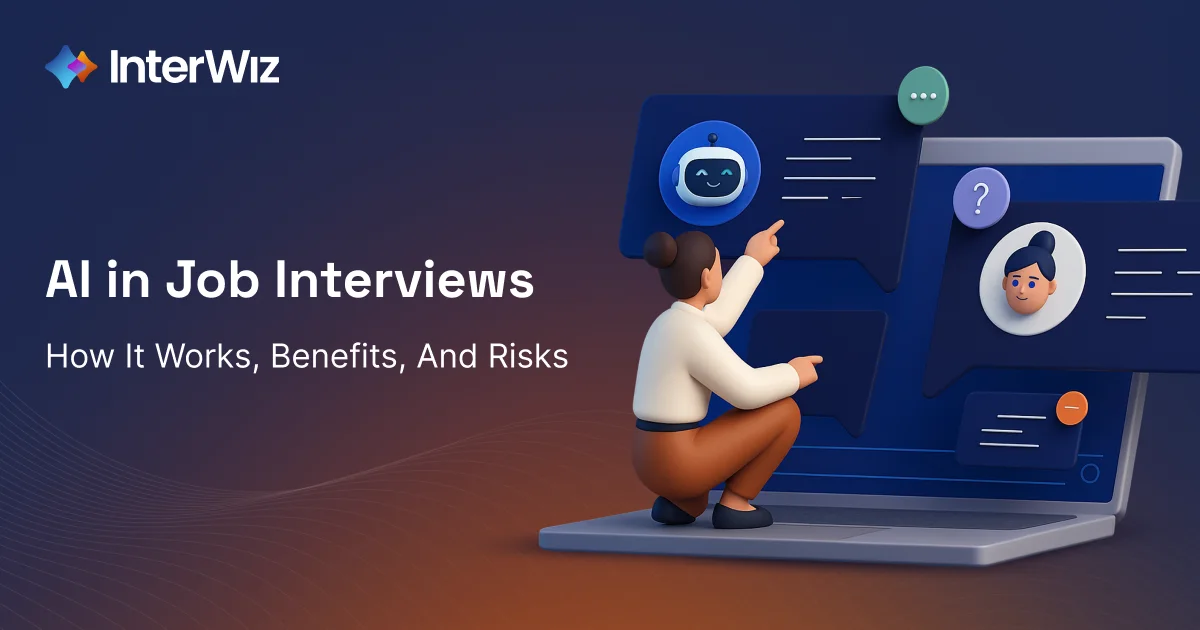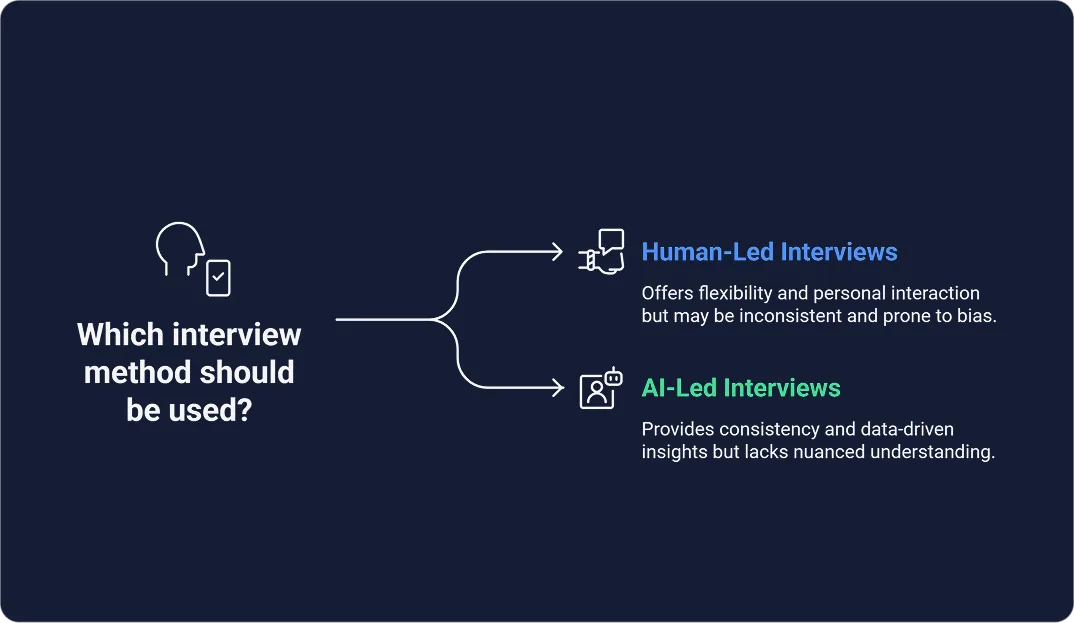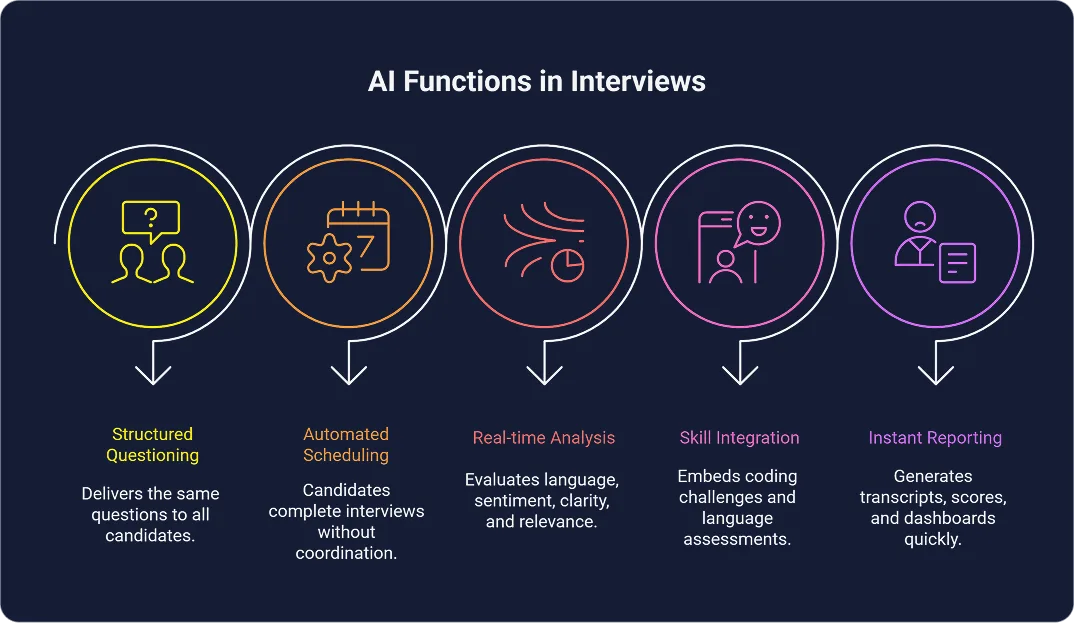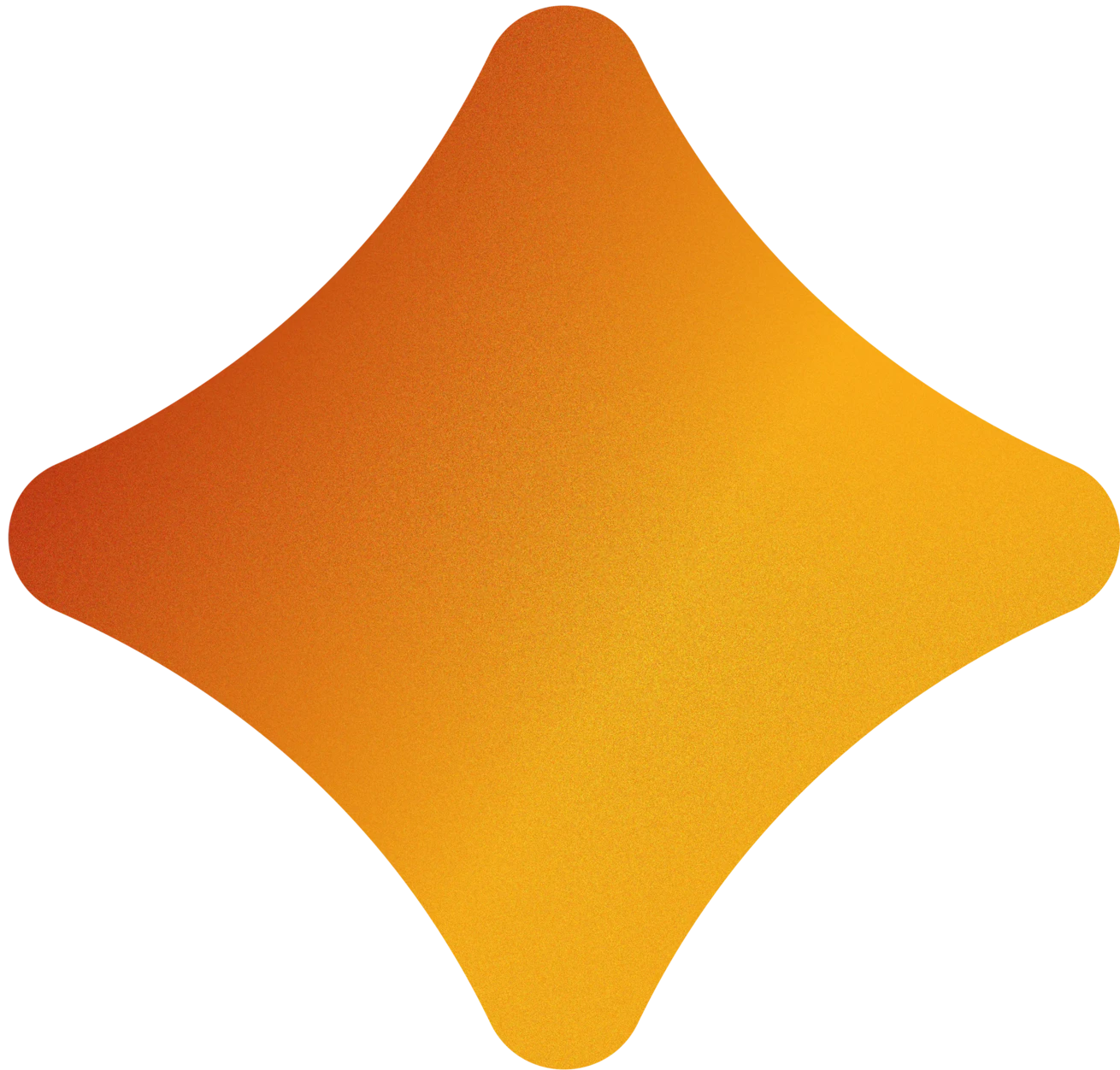Hiring Best Practices | AI-Led Interviews
Using AI for Job Interviews: How It Works, Benefits, and What to Watch For

AI-led interviews are no longer an experimental edge case, they’re becoming a competitive necessity. Recruitment teams using AI for job interviews have reported screening processes up to 60% faster while maintaining or improving evaluation accuracy, particularly in high-volume hiring environments.
The shift is driven by capability, not hype. By combining natural language processing (NLP), video and audio analysis, and machine learning scoring models, AI can evaluate both technical competencies and soft skills at scale, a capability that manual processes often struggle to achieve consistently.
The impact is twofold:
Operational efficiency - repetitive tasks like scheduling, question delivery, and transcription are automated, freeing recruiters for higher-value interactions.
Standardized quality - every candidate is assessed under identical conditions, reducing variability that can creep into human-led interviews.
This doesn’t replace the human element; it enhances it. The best implementations use AI for structure and speed while reserving human judgment for nuanced decisions, culture fit assessments, and final hiring calls.
In this article, we’ll cover how AI interviews work, their measurable benefits and limitations, the leading platforms to consider, and the legal and ethical checkpoints you must clear before implementation.
What Are AI Interviews and Why Are They Used?
AI interviews use advanced algorithms, typically powered by natural language processing (NLP), machine learning (ML), and sometimes computer vision, to automate and standardize the interview process. Instead of relying solely on human interviewers, these systems conduct structured conversations, analyze candidate responses in real time, and generate evaluation reports that can be reviewed by hiring teams.
In practice, this means an AI interviewer can:
Ask role-specific or competency-based questions.
Assess language fluency, tone, and communication clarity.
Evaluate technical answers, problem-solving approaches, or coding tasks.
Generate transcripts, scoring, and recommendations, often within minutes of completion.
The reason companies are adopting this approach is straightforward: speed and consistency. In high-volume or fast-moving recruitment, delays in scheduling and inconsistent scoring can lead to lost candidates and misaligned hires. AI mitigates these risks by ensuring every applicant experiences the same process, eliminating scheduling bottlenecks and reducing variability in evaluation.
Human-Led vs. AI-Led Interviews
Traditional interviews rely on human interviewers to prepare questions, manage scheduling, evaluate responses, and record feedback. While this approach allows for personal interaction and nuanced follow-up, it can be inconsistent; outcomes often vary based on the interviewer’s experience, biases, and interpretation of responses.

AI-led interviews replace many of these manual steps with automated, data-driven processes. An AI system can:
Deliver a structured set of role-relevant questions to every candidate.
Analyze verbal and non-verbal cues for communication skills and engagement.
Score answers against predefined criteria, producing a standardized evaluation.
Compile results instantly, ready for recruiter review.
The core difference:
Human-led: Flexible, adaptive, relational - but prone to bias, scheduling delays, and uneven scoring.
AI-led: Consistent, scalable, data-backed - but limited in handling highly contextual or deeply interpersonal questions.
Should You Use AI for Interviews? Pros, Cons, and Use Cases
AI-led interviews aren’t a one-size-fits-all solution. Their value depends on your hiring goals, role types, and candidate volume. Used strategically, they can significantly improve efficiency and decision quality, but misapplied, they risk damaging candidate experience or overlooking context that only a human can catch.
Key Benefits of Using AI Interviews
Speed and scalability: AI platforms can screen hundreds of candidates simultaneously, eliminating scheduling delays that cause top talent to drop out.
Consistency in evaluation: Every applicant is assessed using the same criteria, reducing variability and interviewer bias.
Data-rich insights: Beyond pass/fail scoring, many tools surface patterns in soft skills, problem-solving approaches, and role-specific competencies.
Reduced administrative load: Automates note-taking, transcription, and shortlisting, freeing recruiters to focus on high-value engagement.
Limitations and Challenges
Bias in algorithms: Without proper training and audits, AI can replicate existing biases in historical hiring data.
Candidate perception: Some applicants may see AI interviews as impersonal or unfair, especially if they don’t understand how scoring works.
Contextual limitations: AI may misinterpret cultural nuances, nonverbal cues, or creative problem-solving approaches.
Compliance risk: Certain jurisdictions now regulate AI use in hiring, requiring transparency and bias audits.
Best-Fit Use Cases
High-volume hiring (e.g., retail, customer service, seasonal staffing) where speed and consistency matter most.
Technical or skill-based screening, where structured assessments can be automated.
Early-stage filtering for specialized roles, followed by human-led interviews for final selection.
Platforms like InterWiz work well in these contexts because they allow recruiters to customize interview templates for role-specific competencies, then review and adjust scoring post-interview, combining AI’s efficiency with human oversight.
What AI Interview Tools Actually Do (And Don’t Do)
Despite the marketing buzz, AI interview platforms are not magic hiring oracles. They excel at automating structured assessments, but they do not, and should not, replace human judgment entirely. Understanding their true capabilities helps avoid both overreliance and misplaced skepticism.
Common AI Functions in Interviews

Structured question delivery: Ensures every candidate receives the same set of role-relevant or competency-based questions.
Automated scheduling: Removes back-and-forth coordination and allows candidates to complete interviews asynchronously.
Real-time analysis: Uses NLP and machine learning to evaluate language use, sentiment, clarity, and content relevance.
Skill and test integration: Embeds coding challenges, situational judgment tests, or language assessments directly in the interview flow.
Instant reporting: Produces transcripts, scores, and analytics dashboards within minutes of interview completion.
What They Can’t Replace (Yet)
Human intuition and empathy: AI can assess communication clarity, but cannot interpret emotional nuance or cultural fit in complex scenarios.
Context-based probing: Automated systems stick to pre-set questions and cannot dynamically adapt follow-ups the way an experienced interviewer can.
Final hiring judgment: Decisions on leadership potential, culture alignment, or long-term fit require human oversight.
Platforms such as InterWiz maintain this balance by automating both screening and in-depth interviews, while giving recruiters the ability to assign custom weightings to different tests after the interview. This ensures scoring reflects organizational priorities without removing human input from the decision.
Best AI Interview Platforms Compared
Not all AI interview platforms are built the same. Some excel at high-volume screening, while others focus on deep technical assessments or behavioral analysis. The best choice depends on your hiring volume, the type of roles, and how much control you want over evaluation.
Key Factors to Evaluate
When assessing AI interview tools, focus on:
Interview formats: Does the platform support asynchronous video, live interviews, or both?
Evaluation scope: Does it measure only verbal responses, or also assess technical skills, problem-solving ability, and soft skills?
Scoring flexibility: Can you adjust weighting after interviews, or are you locked into automated scores?
Candidate experience: Is the interface intuitive, mobile-friendly, and accessible?
Compliance readiness: Does the provider offer bias audits, data transparency, and support for local regulations?
Examples of Well-Known Platforms
Platform | Strength | Best Fit Scenario |
Combines screening and in-depth interviews, allows custom scoring adjustments after interviews, and ranks candidates automatically, giving recruiters both efficiency and control | Teams wanting automation without losing human oversight in final decisions | |
Enterprise-ready with strong compliance documentation and diverse interview formats | Large organizations need robust governance and global rollout | |
Skills-based hiring platform that uses AI to automatically grade technical and soft-skill assessments | Roles where practical skills and job-specific capabilities are critical to success | |
Blends assessments with video interviews for volume hiring | Retail, seasonal, or high-turnover environments | |
Lightweight, quick setup for video screening | Small to mid-sized teams needing fast implementation |
Strategic takeaway: Choose an AI interview platform that fits your hiring process. Tools with rigid, fully automated scoring may save time, but can limit flexibility. Platforms like InterWiz strike a balance by combining automation with recruiter-led scoring adjustments, ensuring decisions remain both data-driven and context-aware.
How to Start Using AI for Interviews in Your Hiring Process
Adopting AI for interviews works best when it follows a clear, structured rollout. This ensures the technology integrates smoothly into your hiring process and delivers measurable results.
Step-by-Step Implementation
Define your goals: Decide what you want to achieve. This could include faster screening, more consistent scoring, or the ability to evaluate soft skills alongside technical competencies.
Choose the right platform: Select a tool that supports your interview formats, integrates with your ATS, and meets compliance standards. Consider whether you need scoring flexibility, technical test integration, or detailed analytics.
Pilot with a small segment: Start with a specific role or department to test the process. Gather feedback from both candidates and recruiters to refine the setup.
Train your team: Ensure recruiters and hiring managers understand how the AI works, how to interpret results, and when to apply human judgment.
Monitor performance: Track metrics such as time-to-hire, candidate drop-off rates, and quality of hire. Compare results with your pre-AI baseline.
Audit and adjust: Schedule regular reviews to check for bias, maintain compliance, and adjust interview templates or scoring criteria as needed.
Pro Tip
Platforms that allow post-interview scoring adjustments, such as InterWiz, give recruiters more control over final evaluations while still benefiting from AI-driven efficiency.
Is It Ethical and Legal to Use AI in Interviews?
AI in HR brings both opportunity and responsibility. It can reduce human bias and improve consistency, but it also introduces new risks if the underlying algorithms are not transparent or regularly audited.
Evolving Legal Landscape
Regulations around AI in recruitment are increasing worldwide.
In the United States, states such as Illinois and Maryland require candidate consent before AI-driven interviews, and New York City mandates annual bias audits for automated hiring tools.
In the European Union, the proposed AI Act classifies AI in recruitment as “high risk,” which means stricter documentation, transparency, and fairness requirements.
Similar frameworks are emerging in Australia, Canada, and parts of Asia. Compliance will soon be a global standard.
Ethical Considerations for Employers
Bias and fairness: Regularly audit AI tools to ensure they are not replicating or amplifying bias.
Transparency: Communicate clearly to candidates how AI is used in their evaluation.
Data privacy: Confirm that platforms store, process, and delete candidate data in compliance with GDPR, CCPA, or other applicable laws.
Human oversight: Maintain human involvement in final hiring decisions to handle context, empathy, and exceptions.
Why This Matters
Beyond avoiding fines or lawsuits, ethical and legal compliance protects your employer brand. Candidates who feel informed and fairly assessed are more likely to engage positively with your hiring process, even if they are not selected.
Bottom Line: Using AI for Job Interviews
AI interviews are most effective when they are used to enhance, not replace, human judgment. They can streamline early-stage screening, standardize evaluations, and surface insights that are difficult to capture through manual processes alone. However, technology should never be the sole decision-maker. The best results come from pairing AI’s efficiency and consistency with human recruiters who can interpret results, assess cultural fit, and make nuanced hiring decisions. By selecting a platform that aligns with your hiring needs, compliance obligations, and candidate experience goals, you can build a process that is faster, fairer, and more effective for both employers and applicants.
FAQs About AI Interviews
Are AI interviews more accurate than human-led interviews?
AI interviews can be more consistent in applying scoring criteria, which reduces variability between candidates. However, accuracy depends on the quality of the algorithm, the data it was trained on, and whether human oversight is included in the process.
Will candidates feel comfortable being interviewed by AI?
Comfort levels vary. Some candidates appreciate the flexibility of asynchronous interviews, while others may prefer human interaction. Clear communication about how AI is used and how results are reviewed by people can help increase candidate trust.
Can AI assess soft skills and cultural fit?
Many AI platforms can evaluate communication style, problem-solving approaches, and adaptability. Cultural fit assessments still rely heavily on human judgment, which is why AI works best as part of a hybrid interview process.
Is using AI in interviews legal everywhere?
No, some regions have specific laws governing AI in hiring, such as requiring candidate consent or annual bias audits. Always check the regulations in the jurisdictions where you are hiring.
How do I choose the right AI interview platform?
Look for a platform that supports your interview formats, provides clear scoring criteria, offers compliance features, and allows the right level of human control. Tools like InterWiz offer post-interview scoring adjustments, giving recruiters both efficiency and flexibility.

High Quality Screening with AI Interviews
Automated interviews built for speed, scale, and accuracy.
🔥 Full features, no credit card required.